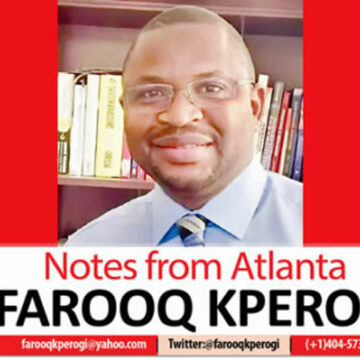OCTOBER 1 is celebrated as Nigeria’s Independence Day. But Nigeria isn’t independent. It is, for all practical purposes, a dependent state, a satellite state, whose political and cultural elites are still tethered to the coattails of colonialism and neocolonialism. Its economy is almost literally run by the World Bank and the IMF, and the older the country gets, the more it seems to tighten the apron strings that tie it to its former colonial overlord.
No one illustrates this contradiction and emotional dissonance more dramatically, not to mention more symbolically, than President Bola Ahmed Tinubu, who chose to depart for the United Kingdom, Nigeria’s former colonizer, for a two-week annual leave just a day after celebrating Nigeria’s so-called 64th independence from British colonialism.
To publicize traveling to rest in a country that colonized you, a day after celebrating freedom from that country’s colonialism is the ultimate national self-ridicule. It’s like a woman throwing a party to celebrate her emancipation from an oppressive relationship with a wild brute, only to show up at her ex-partner’s doorstep the next morning to seek validation.
A president choosing to spend personal time in the country that once colonized his own projects an image of lingering dependence on the former colonial power. It’s an implicit endorsement of the cultural and societal norms of the colonizer over those of the home country and raises questions about national pride and the commitment to fostering domestic tourism and economic growth.
Most world leaders opt to spend their annual leave within their own countries or in neutral locations to support local economies. For instance, former U.S. President Barack Obama often vacationed in the state of Hawaii, his birthplace, while French presidents traditionally spend holidays in French territories. These choices reflect a conscious effort to remain connected with their homeland and to promote its attractions.
Like Muhammadu Buhari before him, Tinubu didn’t find any part of Nigeria worthy of his presidential annual leave. London is worthier of presidential annual leave than any part of Nigeria because these leaders actually disdain Nigeria, which provides the political, social, and cultural basis of their power. That’s such an unrelieved national tragedy.
Nigeria boasts diverse landscapes, rich cultural heritage, and numerous tourist attractions—from the savannahs of the north to the coastal regions of the south, from Yankari Game Reserve in Bauchi to Obudu Ranch Resort in Cross River. By vacationing domestically, the president could spotlight these attractions, boost national tourism and inspire citizens to explore their own country.
It would also send a strong message to potential international tourists (whom this and previous governments seem fixated on attracting) about the safety and appeal of Nigeria as a destination.
But choosing to vacation abroad, particularly in the former colonizing country, redirects personal expenditure away from the domestic economy. While the economic impact of a single individual’s spending might be minimal, the symbolic loss is significant. It suggests a lack of confidence in the nation’s infrastructure, leisure facilities, or security— issues that are within the president’s remit to address and that he claims he is deeply concerned about.
The timing of the trip particularly exacerbates its symbolic dissonance. October 1 is not—or should not be— merely a historical marker; it is—or should be— an annual reaffirmation of Nigeria’s autonomy and identity. Departing for Britain immediately after such a celebration diminishes the day’s significance.
It conveys a message that, despite official rhetoric, the ties to the colonial past remain unsevered on a personal level for the president who should symbolize our national identity and pride.
Leadership everywhere but particularly in transitional, post-colonial countries like Nigeria that are still battling national self-image issues carries the added responsibility of shaping and reinforcing national identity.
The personal choices of presidents often serve as a reflection of their commitment to this role. By engaging in actions that align with national interests and cultural pride, leaders can foster a stronger sense of unity and purpose among the populace.
To be fair to Tinubu, he has signaled from the inchoate stage of his presidency that he wants no truck with national self-pride and that he is a fawning, unapologetic crawler of British colonialism. That was why he pushed the restoration of the discredited, self-humiliating colonial national anthem through the National Assembly with unprecedently breakneck speed.
In my June 1, 2024, column titled “‘New’ National Anthem is National Self-Debasement,” I observed that it’s inexcusable national self-humiliation to discard a home-made national anthem, irrespective of its defects, for one that was made by an imperialist whose influence we’re supposed to be independent of.
“A country whose symbolic song of independence is inspired, written, and composed by the appendicular remnants of imperialist oppressors of whom the country has supposedly been independent for more than six decades isn’t worthy of its independence. Such a country has lost the moral and philosophical argument for independence and against recolonization,” I wrote.
The national anthem, as an auditory emblem of sovereignty, should carry the weight of our independence and self-fashioning. “Arise, O Compatriots,” whatever its deficiencies, was a product of Nigerian composers who won a national contest in 1978.
The national anthem should be a rallying cry. It should encapsulate the country’s ideals, aspirations, and identity, as espoused by the citizens of the country. Reverting to an anthem with colonial ties is a step backward in Nigeria’s journey toward solidifying its post-colonial identity.
So, it should come as no surprise that a president who so casually and so thoughtlessly discarded a homemade national anthem for one that was composed by a British woman is so enamored of colonial tutelage that he chooses to depart for the country that colonized his country a day after celebrating independence from the colonizer.
I noticed that the usual patriotic fervor that most Nigerians evince on October 1 was noticeably absent this year. Maybe it’s because they can sense the lack of investment in Nigeria’s pride right from the presidency—in addition, of course, to the raging hunger and listlessness in the land.
What’s the point of patriotism and national pride when the president of your country is so ashamed of the country that he is restoring symbols of colonial domination?
I was especially piqued that the official statement announcing his London trip said the president “will use the two weeks as a working vacation and a retreat to reflect on his administration’s economic reforms.” What? Why does he need to go to London to reflect on the death and destruction that his IMF/World Bank economic policies are inflicting on Nigerians?
Nigeria is the theater of destruction. That’s where he should be to reflect on his IMF/World Bank economic policies whose outcome is already foretold—deepening mass poverty, hopelessness, torment, extermination of the middle class, etc.
Maybe Tinubu doesn’t need a vacation anywhere. He only needs to descend from his Olympian presidential height to the streets of Nigeria to see the cries, tears, and blood of everyday folks being crushed by the impossibly ponderous weight of his sadistic economic policies.
READ ALSO: Group wants Gov Mutfwang to rescind suspension of traditional ruler
WATCH TOP VIDEOS FROM NIGERIAN TRIBUNE TV
- Relationship Hangout: Public vs Private Proposals – Which Truly Wins in Love?
- “No” Is a Complete Sentence: Why You Should Stop Feeling Guilty
- Relationship Hangout: Friendship Talk 2025 – How to Be a Good Friend & Big Questions on Friendship
- Police Overpower Armed Robbers in Ibadan After Fierce Struggle






